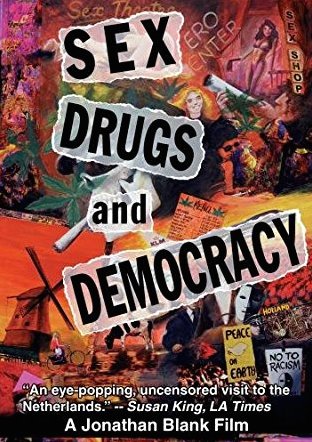Sunday, June 4, 1995.
SEX, DRUGS & DEMOCRACY. A documentary examination of attitudes and approaches to social policy in the Netherlands. Co-written by Barclay Powers. Music by Mark Sterling, Philip Forman and Nick Balaban. Co-written, produced, edited and directed by Jonathan Blank. Running time: 87 minutes. Restricted entertainment with the B.C. Classifier’s warning: occasional explicit sex.
HEY, MAN, CAN I INTEREST you in a thoughtful, thoroughly responsible documentary examination of Dutch social democracy and the effects of tax reformation on societal self-actualization?
What I really meant to say was SEX!
We got naked girls, naked guys, hookers in display windows, live sex on stage, nude beaches, even brothels with wheelchair access.
Don’t go away. We got DRUGS!
Picture a land filled with "coffee shops" for cannabis connoisseurs, friendly neighbourhood hashish emporia offering as many varieties as your local Starbucks.
Do I have your attention now?
Didn’t mean to scare you there, buddy, but you know how it is with these non-fiction filmmakers. They’re all out to change the world.
Take Columbia Film School graduate Jonathan Blank, for example. He’s got a hot property in Holland, and he exploits it with all-American tabloid vigour in his feature Sex, Drugs & Democracy.
A quaint folk, the Dutch are openly tolerant of homosexuality, prostitution, pornography and soft-drug use. They consider "wars" on hard drugs to be a waste of time and public money. And they have no right at all to keep or bear arms.
With such off-the-wall, downright un-American attitudes, you'd figure they're on their way to hell in a hand-basket. You'd figure wrong.
Blank, a wonderfully sneaky sort, is out to challenge some fundamental American notions, provoke some thought and, perhaps, open some minds. He lures us in to see this nation of dirty-minded, spaced-out perverts, then slips in a history lesson about how the Dutch developed their appreciation for individual liberties the hard way.
Dutch independence was won in an 80-year-long war (1568-1648) against Spanish rule. More recently, they survived Nazi occupation and, of course, they co-exist with the unforgiving sea.
"We have built half the country out of water," says Dr. Eddy Engelsman, director of Holland's Alcohol, Tobacco and Drug Policy. "Water cannot be conquered. We have to control it."
Sin, like the sea, is natural and so must be accepted. "We can at least live with it, contain it and control it," he says.
Genuinely conservative but thoroughly pragmatic, the Dutch define freedom rather differently from your average American corporate executive. Says Dr. Peter Cohen, professor of social geography at the University of Amsterdam:
"There is this influence since the late 19th century of social democratic ideas, that you have to protect certain parts of the population against being exploited by other parts. And this has all resulted in a type of society in which basic safety is much higher than in other countries.
"If you want, economically, to typify the Netherlands, you could say that we don't have rich people . . . but we don't have poverty, either."
Sexual and racial tolerance, universal health care, hardly any drug problem, low crime rates and no poverty?
What about taxes?
“I’m not afraid of high taxes,” says Senator Hanneke Gelderblom. “That’s not the issue. The issue is, 'is it fair?’”
“You know the expression 'going Dutch’?” says Amsterdam filmmaker Guilly Koster. “(The Dutch) know how to handle money. They are good managers. Their freedom is supplied by their economic independence."
Freedom.
If we apply the definition used by the United Nations in its Universal Declaration of Human Rights — freedom from want and from fear — the good old U.S.A. would have a tough time making it into the top five.
Uncle Sam (and his NAFTA nephew, Johnny Canuck) would do well to listen to his Dutch uncle — sex, drugs and all.
The above is a restored version of a Province review by Michael Walsh originally published in 1995. For additional information on this archived material, please visit my FAQ.
Afterword: Regardless of their food choices — lamb? ham? roast rabbit? — Canadian familes gathered today for their traditional Easter dinner are likely to be exchanging views on the seismic shift in social policy represented by the bills tabled Thursday (April 13) in Ottawa’s House of Commons. When the legislation passes, as the New York Times noted, “Canada will become only the second nation, after Uruguay, to completely legalize marijuana as a consumer product.” The bills that will be debated in Parliament are scheduled to be implemented on July 1, 2018. In common with the Netherlands of Jonathan Blank’s 1994 documentary, Canada has come to view drug use as a matter of public health policy rather than as a criminal offence. Where the Trudeau government’s initiative differs from the Dutch approach is that it codifies its tolerance of recreational drug use. (In deference to its European neighbours, Holland maintains its anti-drug laws on the books, while at the same time advancing its “Dutch model” of selective non-enforcement.)
A man of many interests, New Jersey-born Jonathan Blank made his directorial debut with the 1992 documentary Collecting America, an examination of baseball memorabilia. Around the same time, he took up the study of martial arts, meditation and Eastern philosophy — in 2011 he co-authored Secrets of Dragon Gate: Ancient Taoist Practices for Health, Wealth, and the Art of Sexual Yoga — and joined socially active organizations such as Greenpeace and Amnesty International. Blank’s single fictional feature was 1998’s Anarchy TV, a satirical look at cable television that starred Alan Thicke and Frank Zappa’s adult children, Dweezil and Moon Unit. Focusing on the Internet in the late 1990s, Blank took up software design and started a music-streaming site. In 1999, he founded Wildform, a Los Angeles-based high-tech development firm. In 2010, he became CEO of Reading Kingdom, an online program that teaches reading skills to children.
